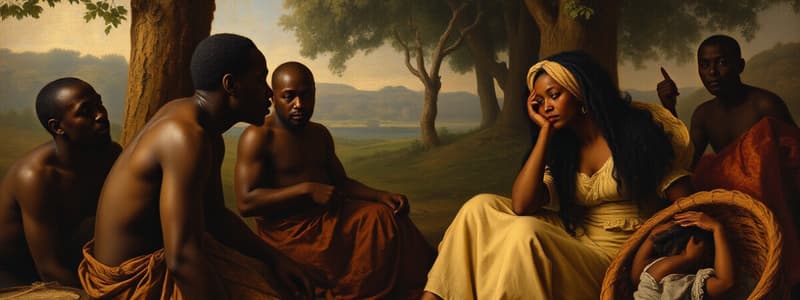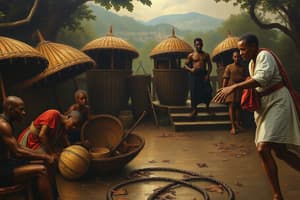Podcast
Questions and Answers
What role did Rev. Francis Le Jau play in shaping attitudes towards slavery in the early English colonies?
What role did Rev. Francis Le Jau play in shaping attitudes towards slavery in the early English colonies?
Rev. Francis Le Jau contributed to the discourse around slavery by documenting experiences and advocating for moral reflections on the institution, influencing public perception.
Describe the significance of the Middle Passage in the context of chattel slavery.
Describe the significance of the Middle Passage in the context of chattel slavery.
The Middle Passage was a crucial route in the transatlantic slave trade where enslaved Africans were transported under brutal conditions, establishing chattel slavery as a dehumanizing system.
How did the English Bill of Rights impact the governance of the colonies?
How did the English Bill of Rights impact the governance of the colonies?
The English Bill of Rights limited the powers of the monarchy and laid the groundwork for representative government, influencing colonial frameworks of governance.
What was the Walking Purchase of 1737 and its impact on Native American relations?
What was the Walking Purchase of 1737 and its impact on Native American relations?
Identify two major uprisings or conflicts involving colonists and indigenous peoples or enslaved individuals and explain their significance.
Identify two major uprisings or conflicts involving colonists and indigenous peoples or enslaved individuals and explain their significance.
Flashcards are hidden until you start studying
Study Notes
Slavery and the Making of Race
- Rev. Francis Le Jau was a key figure in the observation and documentation of slavery and its impact on society and race.
The Middle Passage
- Slavery in the 1660s was characterized by the establishment of plantations and a growing reliance on African slave labor in English colonies.
- Chattel slavery defined enslaved people as property, allowing for their sale, purchase, and inheritance.
- Native American mortality rates during this period were high due to conflict, disease, and displacement caused by European colonization.
- The Middle Passage was characterized by horrific conditions for enslaved Africans, with overcrowded ships, high mortality rates, and brutal treatment during the journey to the Americas.
English Bill of Rights
- The English Bill of Rights, enacted in 1689, established fundamental rights and liberties, influencing democratic governance and individual freedoms in English colonies.
New Colonies
- Maryland was established as a refuge for Catholics facing persecution in England, highlighting religious tolerance in colonial America.
- Connecticut and Rhode Island were founded by dissidents, including Roger Williams, emphasizing the importance of religious freedom and separation of church and state.
- New Netherland, initially a Dutch colony, became significant for its diverse population and trade network.
- New Amsterdam served as the capital of New Netherland before being captured by the English and renamed New York.
- The Dutch played a critical role in mercantile trade and cultural exchanges in the early colonial period.
- New Jersey, Pennsylvania, and the Carolinas emerged as vital colonies, each fostering distinct cultures and economies.
- The Walking Purchase of 1737 involved the deceptive acquisition of land from Native Americans, significantly expanding colonial territory at their expense.
Riot, Rebellion, and Revolt
- The Pequot War (1636-1637) was a violent conflict between Native Americans and English settlers, resulting in significant casualties for the Pequot tribe and territorial shifts.
- The Salem witch trials (1692) were a series of hearings and prosecutions of alleged witchcraft in colonial Massachusetts, reflecting societal fears and religious extremism.
- Bacon's Rebellion (1676) was a revolt led by Nathaniel Bacon against colonial authority, emphasizing class tensions and the demand for land among settlers.
- The Pueblo Revolt (1680) was a successful uprising by Native Americans against Spanish colonial rule in present-day New Mexico, highlighting resistance to oppression.
- The Yamasee War (1715-1717) in Carolina was a conflict between British settlers and various Native American tribes, driven by trade disputes and colonial expansion.
Studying That Suits You
Use AI to generate personalized quizzes and flashcards to suit your learning preferences.




